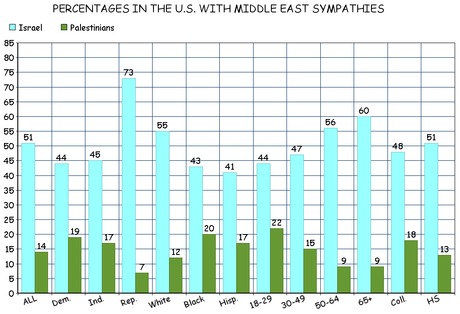
The holocaust against Jews during World War II was a driving factor in this country's backing of the creation of a homeland for the Jews in what is modern-day Israel. And the United States has continued to be a good friend to Israel -- supporting its right to exist with both cash and military aid.
But that was a while back, and things have changed. Instead of just struggling to survive, Israel has now become the bully of the region -- and instead of negotiating a two-state solution in Palestine, it has imprisoned the people of Gaza and the West Bank in their own huge concentration camp. They are trying to starve these people into subjugation as they steal more of their land for Israeli settlements every year. The nations of the West (including the United States) have condemned this subjugation and land theft, but Israel ignores that and continues down its brutal path.
In a just world, the United States (and other Western nations) would take action to force Israel to stop its land theft and aggression toward the Palestinian people, but they are afraid of being seen as anti-Israel (as the specter of the holocaust that happened more than half a century ago still looms large). The chart above (from information in a survey by the Pew Research Center) illustrates why the United States won't change to a fairer Middle East policy, as all segments of U.S society still have a far greater sympathy with Israel than with the Palestinian people (who are the real victims in the current situation).
The United States needs to change its policy toward the Middle East if there is to be any solution to the killing and oppression there -- but that would require some political courage, which neither of our major political parties seems to have.
Former congressman Dennis J. Kucinich has written an excellent article regarding the latest violence in that part of the world, and I think it's a very good appraisal of the situation. Here is what he had to say:
Israel invades Gaza because it can. Gazans, in the face of an invasion, have no ability to strike back, while Israel strikes forward. Israel has total military superiority, an air force which can knock and then bomb, a navy which can shell Gazans from miles off shore, an army which can roll tanks into Gaza nonstop. Gazans have no army, navy, or air force with which to defend. Israel, as any nation, has a right to defend itself, but it confuses offense with defense. It is on the offensive in Gaza. Israel, with its overwhelming military strength, is attacking and invading Gaza in violation of international and U.S. law. Its construction of settlements violates the Oslo agreement. Its Central Bank dries up the Gaza economy and blocks payments to Gazan civil servants. Its total control brings the Palestinians to utter subjection and total despair. Israel can kill, injure, and humiliate Palestinians at will, with impunity, which is exactly what gave rise to Hamas and strengthens Hamas' hold in Gaza, even as the IDF advances. Israel will go door to door in Gaza in the hunt for Hamas, which comprises the government of the Palestinians and is therefore a necessary party to any peace talks. It is axiomatic that if you kill your partner for peace, you will have no partner for peace. There will be no peace, for now, as Gaza is turned into an abattoir, to collectively punish Gazans for supporting Hamas. Israel, in its attempt to divide Hamas from the Gazans, will actually multiply Hamas' strength in Gaza and elsewhere. Israel may indeed find and kill Hamas officials. But it is not the current individuals who make up Hamas who constitute Israel's deep dilemma, which threatens its long term security. It is Israel's policies which gave rise to Hamas and which, if left unaltered, will spawn increased resistance no matter how many members of Hamas Israel is successful in apprehending or killing. What is the end game? To cast Gazans to the sea, where they will be met by the Israeli Navy? To push Gazans into Egypt? To eject all Palestinians to... where? This is a question relevant not only to Israelis and Palestinians, but to the entire world. There will be consequences for this invasion. The cycle of violence will widen. It will draw in friends of the Palestinians and it will affect Israel's allies. In the U.S., as our great friend presses the attack in Gaza, there will be increasing questions among the American people as to whether the $3 billion we give Israel annually is being used to defend our ally, or whether it is buying the U.S. billions of dollars worth of problems because of the manner in which our friend "defends" itself. Since the U.S. is helping to pay Israel's bills, we cannot avoid the consequences of paying the price for Israel's actions against the Palestinians. This is why America must soon shift our role from giving tacit consent to an invasion to becoming an active partner in a new, honest search for peace in the Middle East.

